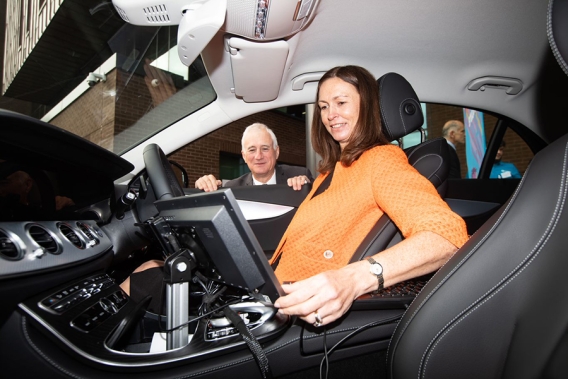Driverless cars are coming and while they won’t be rolled out overnight, UL is very much at the forefront of helping to develop this innovation and address the questions that lie ahead.
The public perception of autonomous vehicles could sometimes be described as sceptical at best, unless of course you have a science and engineering hat on, but the advancement of this type of transport option is moving at a pace that we should be taking notice of.
As the reality of this lifestyle-changing technology nears, the key challenges facing the development of autonomous vehicles in Ireland will be addressed through a €4.2m research collaboration led by Lero, the Irish Software Research Centre based at University of Limerick.
The project brings together 11 companies to work on a variety of autonomous systems projects across the automotive, industrial and agricultural sectors.
As part of the programme, researchers from Irish academia including UL, global automotive and Irish firms will collaborate on key international challenges facing the development of driverless vehicles, especially those working in the same environments as pedestrians, animals and human-operated vehicles.
Researchers from across Lero along with SFI research centres CONNECT and Insight, will work with multinational industry partners such as Jaguar Land Rover, Kostal, Liebherr and Valeo; large indigenous Irish companies like Combilift and Dairymaster and smaller Irish companies including Greenval, Mobimetrix, PMS Pavement Management Services Ltd, Reamda and Transpoco.
The project funding includes a €2m contribution by Government through Science Foundation Ireland.
For context, there are six levels of driving automation, as defined by the Society of Automotive Engineers. Officially listed from 0 to 5: 0 means no automation – where the vehicle is fully controlled by the driver; and 5 means full automation, where the vehicle performs all tasks under all conditions.
With level 5 autonomy still in the future, we have seen some levels of integration in technology developments recently. Indeed the concept is so advanced that automotive manufacturers are investing vast amounts in autonomous R&D with a view to bolstering revenues of the future.
According to Professor Brian Fitzgerald, director at Lero, “Revenues from autonomous systems have been projected to be worth over $100 billion by 2030.
There is no reason why Ireland cannot be a serious research player in this vital sector.

“For example, we are already working with companies such as Valeo in Tuam on autonomous vehicle research and it is Ireland’s variable climate and streetscape which gives it an advantage over the more uniform climate and road networks of, for example, San Francisco.”
“Over the last few years we have been steadily expanding our research capabilities and experience in autonomous systems,” added Joe Gibbs, General Manager, Lero who was responsible for putting the consortium together.
Dr Siobhan Roche, Director Science for the Economy, Science Foundation Ireland explained, “Autonomous systems (AS) represent a disruptive technology that is a crucial component of many industries, all of which are key to Ireland’s future growth. The research knowledge gained in this programme will help to build world-leading capability in AS, helping to establish Ireland as an important player in the autonomous IT eco-system and delivering outcomes that can play a significant part in Ireland’s economy.”
The collaboration is a significant development as it brings together researchers from three key areas: software, analytics and connectivity.
CONNECT’s researchers will focus on the connectivity challenge as it is of central importance for autonomous vehicles, which will need to communicate and share information with each other, with the city infrastructure and with vulnerable road users such as pedestrians and cyclists.
They will explore ways to make communication networks faster, more reliable and capable of handling increased information flows, while preserving privacy.
Ultimately, the goal is to make transport safer, less congested, and more environmentally friendly.
Professor Noel O’Connor, interim CEO of Insight SFI Research Centre for Data Analytics, added, “We are working with industry partners to study driver attention and engagement with a view to ensuring that the driver is in the loop when required and that their interaction is commensurate with their capacity at that time. The industry-led partner project will use inexpensive and unobtrusive sensors, mainly cameras, addressing situations where decisions are required in real time.
Research will use a user-centred methodology to aid in user acceptance of connected/autonomous vehicles.”
“All of these projects will enhance the education and professional experience of PhD and post-doctoral level researchers in the area of autonomous systems. This will support the growing needs for such talent in both Irish-based multinationals and start-ups,” Joe Gibbs concluded.
- Andrew Carey
